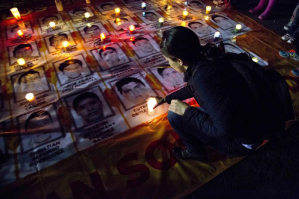
The FBI has stepped in to provide assistance to the Mexican government as it searches for answers in the ongoing mystery surrounding the disappearance of 43 students in late September. Mexico's president, Enrique Peña Nieto, is also slated to meet with President Obama in Washington on Jan. 6.
The teaching students from the small town of Igualla, Guerrero - in southern Mexico - were kidnapped while traveling to participate in protests commemorating the nearly 50-year-old military massacre of students in the capital square of Tlatelolco.
Over the past three months details of the young men's disappearance have surfaced, revealing the possible involvement of José Luís Abarca, the mayor of Iguala, and his wife, Maria de los Angeles Pineda, who allegedly ordered the arrest of the students.
According to NBC News, a U.S. Government official confirmed that American scientists are assisting in analyzing DNA from remains uncovered in November. But one investigative reporter and author, Anabel Hernandez, believes that the Mexican government's request for help doesn't camouflage what may be its own involvement in the kidnapping.
"Nothing was an accident that night," she told NBC News.
Hernandez, who has authored a book on Mexico's drug war and is now a fellow at the University of Berkeley's Center for Investigative Reporting, believes she has uncovered evidence that reveals that federal police were also monitoring the student's movement before the kidnapping.
Cell phone footage and government documents, she says, reveal that federal police were present for reasons unknown. NBC News asked the Mexican federal police for clarity but all questions were directed to the attorney general's office. His office declined to comment.
After the students were ambushed by corrupt local police, they were then turned over to the deadly Guerrero Unidos, or Warriors United, gang. Three members of that gang confessed to Mexican authorities that they packed the young men so tightly into a dump truck that 15 of them died from suffocation. The remaining students were shot, they said, their bodies burned for 15 hours, and what was left of their remains, bagged or strewn along a nearby river.
In November, Mexican Attorney General Jesus Murillo Karam answered questions during a press conference for more than an hour as he relayed the gruesome details of recovered evidence.
"They threw them to the lower part of a landfill to burn bodies. They stood watch to make sure the fire would last hours putting diesel, petrol, tires, wood, plastic and other elements they found in the area," he said, referencing confessions of Guerrero Unidos gang members.
At the end of that meeting, Murillo Karam said, "Ya me canse," or "I've had enough." His three words ignited outrage across the country, where #YaMeCanse and #estoycansado, or "I'm tired," began trending on Twitter.
The attorney general's comments, and the lack of transparency by the government, has caused increased marches, protests, violence and damage since the student's disappearance. Citizens are outraged and tired of the poverty and death that has come at the hands of corrupt government officials who are in the pockets of violent drug gangs.
And they want answers.
While the Mexican government is appearing to be just as baffled by the kidnappings as the rest of the world, Hernandez isn't buying it. Three weeks ago, the findings of her investigation were printed in a story co-authored by journalist Steve Fisher for the Mexican magazine Proceso.
In that article, Hernandez claims that the attacks were orchestrated and executed by the Federal Police, with cooperation from the Army, and the kidnappings were not ordered by Abarca.
"The government knew exactly what was happening," she told NBC News.






